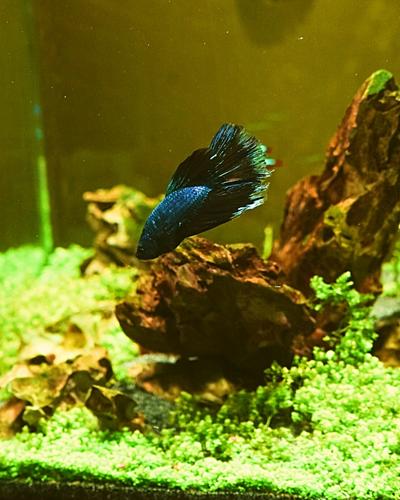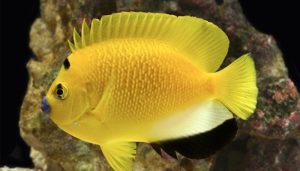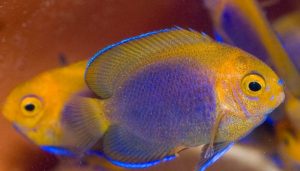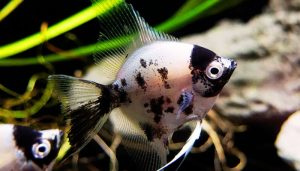Can betta eat tropical flakes? Bettas are famous for their bright colors and unique personalities, making them popular among fish enthusiasts. However, when it comes to their diet, many owners are often unsure about what foods suit their bettas.
One of the most common questions asked is, “Can betta fish eat tropical flakes?” While bettas can technically eat tropical flakes, they are not the most nutritious option.
In this blog post, we will explore the topic of betta fish and their diet, specifically focusing on whether they can consume tropical flakes.

Additionally, we will provide three better alternatives to ensure your Betta receives the necessary nutrients for a healthy and happy life.
So, if you’ve ever wondered, “Can bettas eat tropical flakes?” keep reading to find out more!
Table of Contents
ToggleWhat Are Tropical Flakes?
Tropical flakes are a type of fish food specifically designed for tropical fish. These fish flakes are popular among pet owners looking for a nutrient-dense and balanced diet for their aquatic pets.
These flakes contain essential nutrients and minerals that tropical fish need to thrive, such as proteins, vitamins, and minerals.
The fish meal used in producing these tropical fish flakes is sourced from a variety of marine and freshwater fish species to provide a complete and balanced diet.
What sets tropical flakes apart from other fish food is that they are specifically formulated to meet the unique nutritional requirements of tropical fish.
With the right diet, tropical fish can live long, healthy lives and tropical fish flakes are a great way to ensure that your pet fish receive the nutrients they need to thrive.
Understanding the Dietary Needs of Betta Fish
Can bettas eat tropical fish flakes? Betta fish are carnivores by nature, and their diet primarily consists of protein-rich foods. In their natural habitat, Wild bettas feed on small insects, larvae, and other aquatic organisms.
They require a diet that is high in protein and low in carbohydrates. A well-balanced food for betta fish helps maintain their vibrant colors, promotes healthy growth, and strengthens their immune system.
While a plant-based diet may sustain them temporarily, it lacks the necessary nutrients for this species, leading to sickness and eventual death of the fish.
Due to their short digestive tracts, betta fish are inefficient at processing fillers such as corn and wheat. These fillers are commonly present in pellet and flake foods and can cause bloating and digestive problems in excess.
Can Betta Fish Eat Tropical Flakes?
Can bettas have tropical flakes? Yes, betta fish can eat tropical flakes, but it’s not recommended as their primary diet. Tropical flakes lack the protein content that betta fish require for optimal health.
A diet consisting of tropical flakes can lead to malnutrition and a weakened immune system, making betta fish more susceptible to diseases.
It’s best to feed a betta fish a varied diet that includes high-quality pellet or flake food specifically formulated for bettas, frozen or live foods such as bloodworms or brine shrimp, and occasional treats like chopped vegetables or fruits.

When choosing Betta fish food, ensure protein is at least 40%, and the ingredients list includes whole fish or fish meals. It’s also important not to overfeed betta fish, as they have small stomachs and can easily become bloated.
Can betta eat tropical fish flakes? In summary, while betta fish can eat tropical flakes, it’s not recommended as their primary diet. A varied diet that includes high-quality betta-specific pellet or flake food, frozen or live foods, and occasional treats will ensure optimal health and well-being for your betta fish.
The Pros and Cons of Feeding Betta Fish Tropical Flakes
Tropical flakes are a common staple food for many tropical fish species. While betta fish can eat tropical flakes, it’s important to understand the pros and cons before making it a significant part of their diet.
Pros:
- Convenience: Tropical flakes are readily available and easy to store.
- Cost-effective: Compared to some other food options, tropical flakes are generally more affordable.
Cons:
- Lack of crude Protein: Tropical flakes are often formulated with a lower protein content, which may not fulfill the dietary requirements of betta fish.
- Fillers and Additives: Some tropical flakes contain fillers and additives that are not beneficial to betta fish and can lead to digestive issues.
- Bland Taste: Betta fish are picky and may not find tropical flakes as tasty as other foods.
Better Alternatives to Tropical Flakes
What Are Good Alternatives for Tropical Fish Flakes? It is recommended to consider these three better alternatives to tropical flakes. To ensure that make your betta fish receives a nutritionally balanced diet,
Option 1: High-Quality Betta Pellets
Betta pellets are specifically formulated to meet the dietary needs of betta fish. They are usually protein-rich, contain essential vitamins and minerals, and are highly digestible. Look for high-quality betta pellets made with natural ingredients that do not contain fillers or artificial additives. Pellets should be appropriate for your betta fish to prevent overeating or choking.
Option 2: Freeze-Dried Bloodworms
Freeze-dried bloodworms are a popular treat for betta fish. They are high in protein and offer a closer resemblance to the live foods bettas would consume in their natural habitat. Bloodworms provide variety to their diet and can be used as a supplement rather than a primary food source. Remember to rehydrate the bloodworms before feeding them to your betta fish to prevent digestive issues.
Option 3: Live or Frozen Foods
For optimal nutrition and to mimic their natural diet as closely as possible, live or frozen foods are excellent choices for betta fish. These foods include brine shrimp, daphnia, and mosquito larvae. Live foods provide bettas with essential nutrients and offer stimulation during feeding. Frozen foods are a convenient alternative and retain much of the nutritional value of live foods. Just be sure to thaw frozen foods before feeding them to your betta fish.
Ensuring a Balanced Diet for Betta Fish
While exploring alternative food for betta fish, it’s important to remember that a well-balanced diet is key to maintaining the health of your betta fish. Here are a few tips to ensure their nutritional needs are met:
- Variety: Offer a diverse range of foods to provide a mix of nutrients. Rotating between high-quality betta pellets, freeze-dried bloodworms, and live food is a great for keeping their diet interesting and nutritious.
- Portion Control: Avoid overfeeding your fish. They have small stomachs and can easily become overweight. Feed them small portions that they can consume within two minutes, two to three times a day.
- Observation: Observe your betta fish’s behavior and adjust their diet accordingly. If they show signs of not enjoying or eating certain foods, try other options to cater to their preferences.
- Water Quality: A healthy diet is closely linked to good water quality. Ensure you maintain a clean and well-filtered aquarium to prevent water-related health issues.
- Consult a Vet: If you have concerns about your betta fish’s dietary needs or health, consult a veterinarian experienced in caring for fish. They can provide personalized diet plans based on your fish’s specific requirements.
What Kind of Tropical Flakes Does Betta Fish Like?
Can bettas eat tropical flakes? Betta fish may eat different tropical flakes, but it’s important to note that tropical flakes alone do not provide complete nutrition for betta fish. Betta fish require a protein diet, and tropical flakes may not meet their nutritional needs.
If you choose to feed your bettas tropical flakes, looking for high-quality flakes that contain whole fish or fish meal as the first ingredient and have at least 40% protein content is recommended. It’s important to avoid betta flakes that contain fillers or low-quality ingredients, as they may not provide the necessary nutrients for your betta fish.
While tropical flakes can be a part of a betta fish’s diet, it’s important to supplement their diet with other foods, such as high-quality pellets, and live or frozen foods like bloodworms or brine shrimp. These foods will provide the protein and nutrients that betta fish need for optimal health and well-being.
Ultimately, the key to a healthy and happy betta fish is a varied diet that meets their nutritional needs. It’s best to consult a veterinarian or an experienced fish keeper to determine the best betta fish food.
When & How to Feed Your Betta with tropical fish flakes?
When do betta fish eat tropical flakes? If you have a Betta as your pet, you need to provide it with the right food. Tropical fish flakes are one of the most commonly available food for bettas in the market and are suitable as Betta food too. You can find fish flakes easily at a pet store, which come in different varieties.
However, while offering your Betta this food, you must be careful about how much you feed your Betta. Overfeeding can lead to health problems, and uneaten food can result in dirty water. It is recommended to feed your Betta with tropical fish flakes once or twice a day and with only small amounts of flakes at a time.
You can also mix some pellets with the flakes to add variety to their diet. Overall, when it comes to feeding your Betta fish with tropical fish flakes is a good option, but it’s important to pay attention to the right amount and frequency of feeding.
Can Betta Fish Eat Tropical Fish Food Commonly Asked Questions (FAQs)
Can I feed my betta fish only tropical flakes?
Can bettas eat tropical fish food? While tropical flakes can be part of their diet, providing a more diverse range of foods is recommended to meet their nutritional requirements.
How often should I feed my bettas fish?
Feed your betta fish in small portions two to three times a day. Monitor their behavior and adjust the feeding schedule as needed.
Are live foods necessary for betta fish?
Live foods provide essential nutrients and enrichment but can be supplemented with high-quality betta pellets and freeze-dried alternatives.
Can Betta fish eat regular fish food?
Betta fish have specific dietary needs, and regular fish food may not fulfill those requirements. It’s best to choose food formulated specifically for bettas.
Is it normal for betta fish to be picky eaters?
Yes, betta fish are known for their selective eating habits. Offering a variety of foods can help cater to their preferences and nutritional needs.
Why are tropical flakes not the best option for feeding betta fish?
Tropical flakes may not provide the nutrients betta fish need to be healthy. They are formulated for tropical fish in general and not specifically for bettas.
What are some better alternatives to feeding betta fish than tropical flakes?
The three best options for feeding betta fish are betta-specific pellet food, freeze-dried food, and live/frozen food.
Can bettas eat regular fish flakes?
Bettas can eat regular fish flakes but may not get all the necessary nutrients in their diet.
What should be included in a betta fish’s diet?
A well-rounded betta diet should include a mix of betta-specific pellet food, freeze-dried food, and live/frozen food.
Can Betta fish survive without food?
Bettas cannot survive without food, typically lasting only a few days.
Can Betta fish eat flakes and pellets together?
Can betta eat flakes and pellets? Yes, betta fish can eat both flakes and pellets together. However, it’s best to choose one type of food for your Betta and stick with it to ensure that all necessary nutrients are provided.
What nutrients do bettas need in their diet?
Bettas are carnivorous fish and need a high-protein diet. They also need vitamins and minerals, such as vitamin C, calcium, and phosphorus.
Where can I find betta-specific food?
You can find betta-specific food at your local pet store or online.
How much should I feed my betta fish?
How much can a betta fish eat tropical flakes? A good rule of thumb is to feed your betta fish 2-3 pellets once or twice a day or the equivalent of freeze-dried or live/frozen food.
Can you feed a betta fish tropical flakes?
Can betta eat tropical fish food? While bettas can technically eat tropical flakes in a pinch, it’s not ideal as their main food source. These flakes often lack enough protein and may contain fillers not suitable for bettas’ carnivorous diet.
Can bettas eat fish flakes?
Can you feed betta fish tropical flakes? Yes, bettas can eat fish flakes, but choose high-quality flakes specifically for bettas. Tropical flakes lack optimal protein & may contain fillers. For ultimate health, high-protein betta pellets are ideal. Mix in live/frozen food as occasional treats!
Final Thoughts
So, can bettas eat tropical fish food? In conclusion, while betta fish can eat tropical flakes, better alternatives are available to meet their nutritional needs. High-quality betta pellets, freeze-dried bloodworms, and live or frozen foods offer higher protein content and a more natural diet. Remember to provide a varied and balanced diet, observe your fish’s behavior, and maintain good water quality. By doing so, you can ensure your beloved betta fish’s optimal health and vitality.
You might also like
- 5 Winning Tips for Betta Fish Feeding During Vacation
- Is My Betta Fish Dead or Just Sleeping: (7 Signs to Look Out For)
- Can My Betta Fish Eat Goldfish Food! (Or Will It Be Harmful?)
- How Often Should You Feed Betta Fish? & How Much! (Solved)
- Why Do My Betta Not Eating? 5 Simple Reasons! (Solved)
- Are Betta Fish Smart: 5 Mind-Blowing Tricks They Mastered!
- Betta Fish Overfeeding 101: Recognizing Symptoms and Quick Fix
- Betta Spitting Out Food: 3 Common Causes & Quick Solution!
- Bloated Belly Betta Fish: Symptoms, Causes & Quick Fix!
- Betta Fish Bloated 101: Common Causes & Effective Treatment




